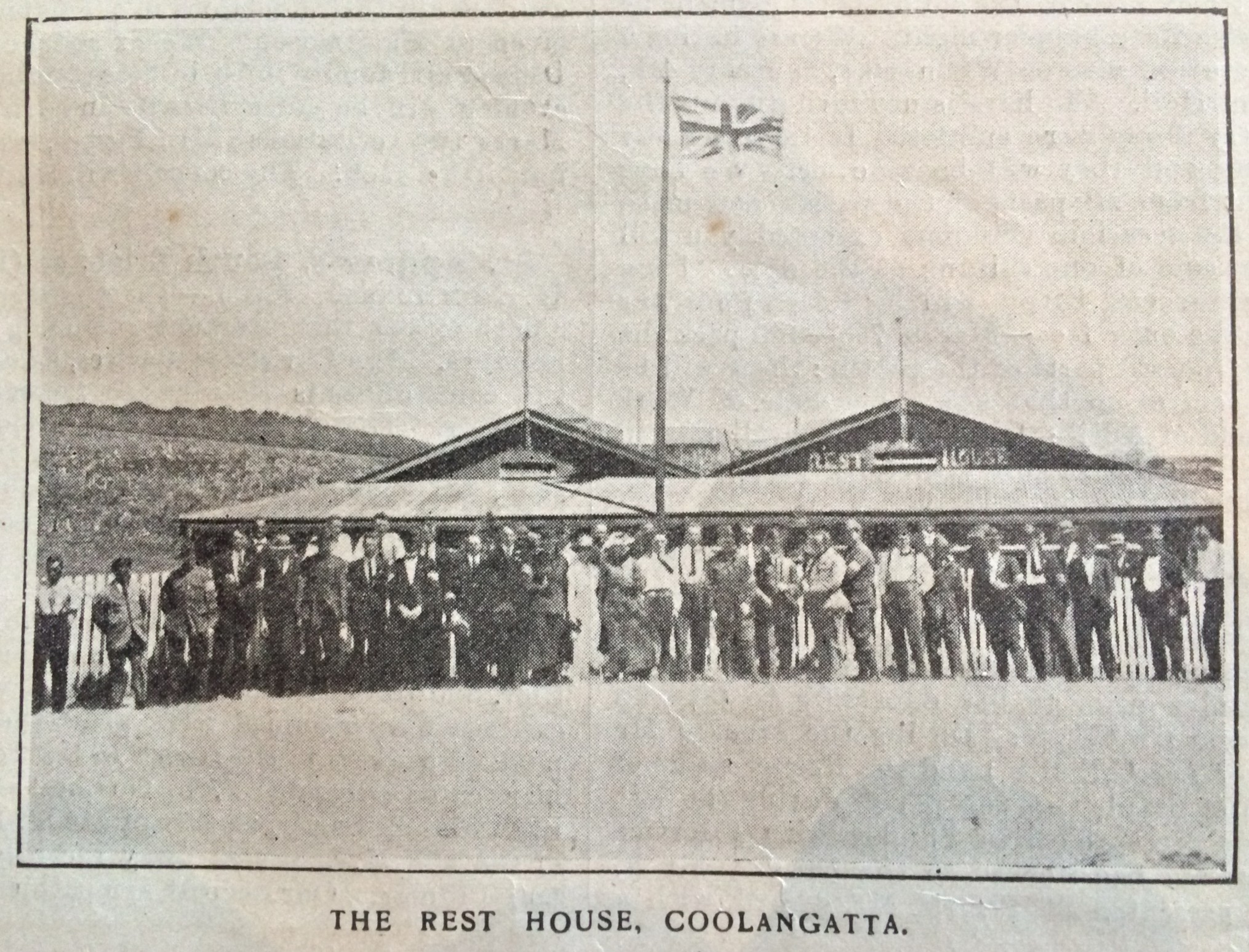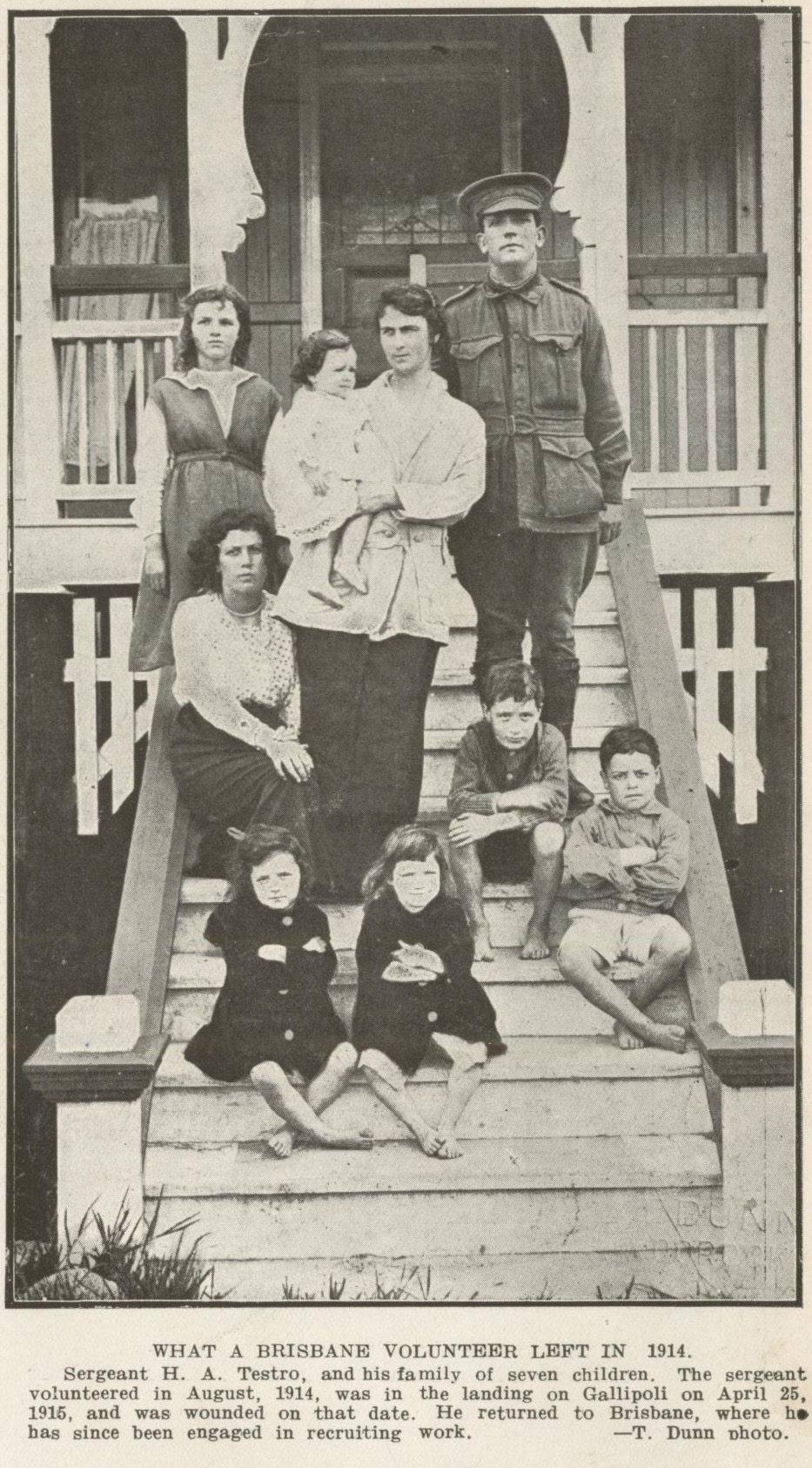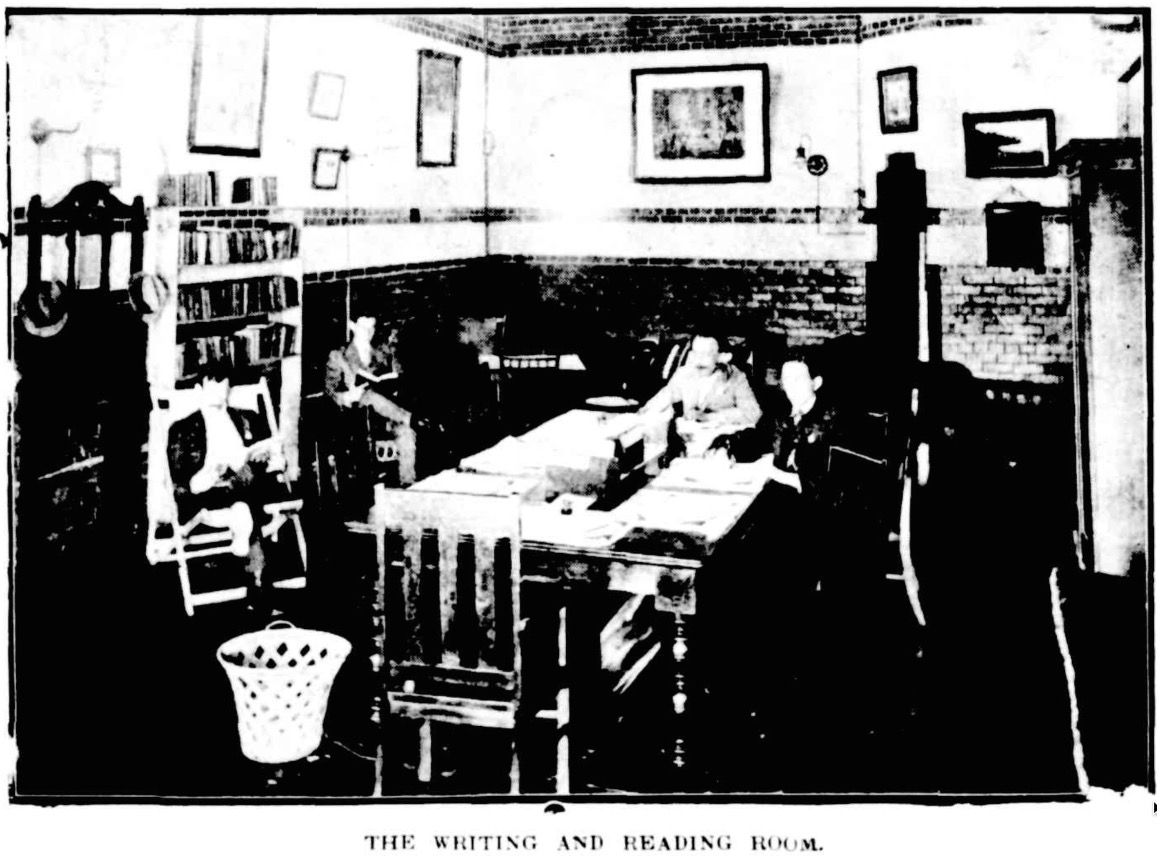Our Soldier Boys
ABOVE: This photo illustrated the column penned by Canon Garland (transcribed below) which appeared in the 1 March 1916 issue of the Church of England (Anglican) monthly newspaper, “The Church Chronicle” (page 51). The caption read: “Soldiers, leaving for the Front, saying good-bye to the Resident Chaplain”. Chaplain Lieutenant Colonel Garland is depicted in this poignant moment – probably taken in early February 1916 at the newly-built Railway Camp Station (today’s Gaythorne) – waving off a trainload of First AIF troops bound for Pinkenba and an awaiting troopship.
OUR SOLDIER BOYS.
‘Nothing is too good
for our Soldiers.’
The great event of the last month was the damage caused by the storms, a full account of which has appeared in the daily papers.
It, however, was serious for our work, living as we do from hand to mouth.
The Military Authorities suffered as we did – all their large tents were blown, but they have resources not at our command.
Other Organisations providing for the welfare of the soldiers likewise suffered, and at least one of them seems to have resources which should put to shame the members of the Church of England.
Of our six tents, one was damaged beyond repair, the others suffered more or less. A good deal of property was damaged, but, fortunately, the pianos escaped owing to their being well protected with American cloth covers [ tarpaulins ].
Such things as our bagatelle boards were seriously damaged, while games likes draughts were simply swept away. Stationery was damaged, but, owing to our method of distribution, the loss was not serious. Books and magazines suffered a good deal.
Will our friends at once replace these things for us – particularly by sending me sets of draughts and draught boards? Surely someone has a bagatelle board to give the soldiers.
The damage to the tents has meant a heavy expense, which has run us into nearly £300.
At Rifle Range, we are now replacing the tent with a wood and iron structure, which will prove more permanent.
The question has been asked me, why we did not begin with these structures, to which the answers are many and convincing.
The Military Authorities themselves were not quite sure of the permanency of any site for a Camp. Our largest tent has been moved four times, if it had been originally of wood, to-day it would not be of much service; but it is now almost as good as new, after allowing for reasonable wear and tear.
Then I was not sure how much money would be forthcoming. Now I am making a still bolder venture in putting up one wooden structure, and I hope I shall receive the necessary financial support.
The financial strain caused by all this is naturally an anxiety, but the real drawback was the loss of a “Home” for the boys in camp, and the stoppage of our work amongst individuals. Indeed the storms have done one good thing – they have proved the wisdom of our policy, because while our “Homes” were wrecked, the difficulties of getting in touch with the boys became insuperable.
One boy said to me to-day, as I was inspecting the newly-restored tent: “This is homely again – we were miserable without this tent.”
That was a Camp in which the Church of England is the only body making provision for the soldiers’ recreation.
The storms wrought us damage, but that is a small price to pay for the good they have brought the country, which to-day is smiling with verdure, the grass seeming to grow visibly, the cattle seeming to be happier, while the trees are adding fresh beauty day after day.
Thank-offerings for the rain devoted to the soldiers who are offering themselves and their lives to preserve our country are but a small price to pay for the break-up of the drought.
At one Camp, the day our tent was restored, 1,600 letters were written in it.
Great care was taken by one of our staff in charge of the tent to see that there was no waste, but the fact that 1,600 letters were written shows how much these recreation tents do. Think of the joy given to the parents and wives and sweethearts, and sometimes children, by such letters!
How they will be read, and in days to come, treasured – especially if the writer falls on the field of honour!
Many of us know how difficult it is to sit down and write letters, and it must be much more so with boys in camp. There are no facilities for the purpose except these tents provided by the Church and other organisations.
The disposition to write letters is one which is to be encouraged, to me the writing of letters to relatives by the boys in camp is sacramental; because I hold firmly that a boy will not go very far wrong who writes a weekly letter home.
An interesting incident occurred this week as a result of my desire for economy: I had stopped printing our envelopes with the King’s picture and the name “Church of England Chaplain’s Department”, and supplied only plain, un-printed envelopes – thus saving the cost of printing.
The boys in one tent used up the old printed envelopes first, pushing the un-printed envelopes on one side, and afterwards asked for printed envelopes – saying they preferred them.
I wonder is it pride in their Church, or what is the reason? At any rate it does show that the boys are glad their Church cares for them. My attempt at economy failed, and our friends will have to pay for it.
I am most grateful for the response to our appeal for the formation of Branches.
The newly-formed Cathedral Branch began its existence by guaranteeing £50 to ensure the engagement of a secretary for our tent at the Exhibition, and followed that up by paying in almost the whole amount within a week.
Springsure is the first country parish to respond to the request for the formation of a Branch of the Society. Ithaca – which has already done so much for the soldiers in Camp – is the first metropolitan parish to form a new branch.
A word is due to the Parish of Holy Trinity, South Brisbane, where the Rev. F. Quirk, without waiting for any request, appealed to his congregation the day after the second storm, with the result that in a few days he sent a cheque for £20 towards the Restoration Fund. Holy Trinity, South Brisbane, has not the advantages that some other parishes have, but it is not the first time, or the first way, in which it has lead the Diocese.
There is no doubt if an effort is really to be made to form a Branch, there is no parish in which there will not be a response, and the parish will be the richer and not the poorer for its linking up with the greatest opportunity the Church ever had of reaching her sons when they are responding to religion as they have never done before, and calling for the Sacraments which have been too often passed by under other circumstances.
Our social work is freely at the disposal of every soldier, no matter what his denomination may be, and would be worth all it has cost if only for the comfort and happiness is gives the soldiers.
The spiritual side – of which I have said nothing this month – should appeal still more strongly to all earnest Church people. We try to look after our own sons from that point of view as far as possible, respecting scrupulously at the same time the convictions of those who do not accept the Church’s teaching.
There are therefore two sides, one of which should draw sympathy and financial support from everyone. Give to either our social work or our spiritual work, and thus help the soldiers.
Subscriptions, which I hope will come in freely during the month of March, to prevent us going into debt for our storm expenses, should be addressed to me, not to Camp, but to Box 47, G.P.O., Brisbane. All parcels should be addressed to me to St. Luke’s Church, Charlotte Street, Brisbane.
The Editor has warned me that I must be brief this month and he has been so generous towards our Society that I must not trespass upon him, but I hope to expand these notes in a Monthly Leaflet, which we will gladly send to anyone interested.
David J. Garland
Resident chaplain.
19 February 1916.



